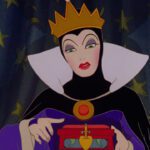A Decade of Disney: Pocahontas (1995)
Virginia: Hello and welcome back to A Decade of Disney, in which we’re reviewing all the films of the studio’s Renaissance period. Today we’ll be talking about 1995’s Pocahontas, which was poised to become the animation giant’s biggest hit yet and ushered in an era of diverse lead characters. At the time of its production, Walt Disney Animation studio chief Jeffrey Katzenberg believed that Pocahontas would go one step beyond Beauty and the Beast, netting him a best picture Oscar. Not only was this ultimately not the case, but Pocahontas sparked a controversy about the portrayal of Native Americans in Hollywood films. Critically and financially. the film did OK, but nothing like the studio heads had been anticipating. It was dwarfed by the success of its progenitors, and to this day it sits in their shadows. As a child, Pocahontas was actually one of my very favorites. I loved to pretend I was Pocahontas, and I was swept up in the colors and musical cues. However, looking back on it as an adult, I don’t care for this film. The racial concerns are valid, and while the film certainly has merit, I don’t think the good quite outweighs the bad and mediocre. What do you think of Pocahontas, Munir?
Munir: As we mentioned in our Lion King review, this was the film where top animators (like Glen Keane) were working, and all hopes rested in making it another Beauty and the Beast. As you said, that wasn’t the case, but the film was still successful at the box office, and it won the same two Oscars (best score and song) that its predecessors did. It’s also worth noting that Pocahontas was the first film were POC were cast to reflect their ethnicities accurately. Aladdin has Middle-Eastern characters, but the whole cast is white. Conversely, Pocahontas sparked that trend that we see now with the casting of Disney animated films. Personally, I think it’s for the best. However, it couldn’t replicate the success of The Lion King, and the remaining Renaissance films couldn’t match the heights of “the big four” either critically or financially. They didn’t flop or become forgotten like films from the following decade, but they were never as successful or popular as those first four. I also liked Pocahontas as a kid, although it was never one of my favorites. The animation, the score, and the songs are the highlights, but the characters and story are not very well-developed. I still enjoy it, but I can also say that it’s the weakest film from this decade (alongside The Rescuers Down Under).

V: For me, Pocahontas is undoubtedly the weakest of this decade because I can’t connect with it emotionally. The characters feel like cardboard cut-outs, and while the story could have been great, the struggle isn’t fleshed-out. They basically say that both the English settlers and the Powhatans were monsters who refused to accept one another. I don’t see how this is a fair or true statement when the English had no business being there in the first place. This is what happens when capitalism and history intersect, and unfortunately, this wouldn’t be a first (or last) for Disney. The next weakest for me would be Hercules, but I’ll save that for our review. Do you have a favorite character in Pocahontas? It’s hard to choose because they’re mostly flat and generic with little to no development. However, I would choose Nakoma because she’s very reasonable and just wants her friend to be safe. She’s also the first female, human friend of a Disney Princess, which is pretty cool.
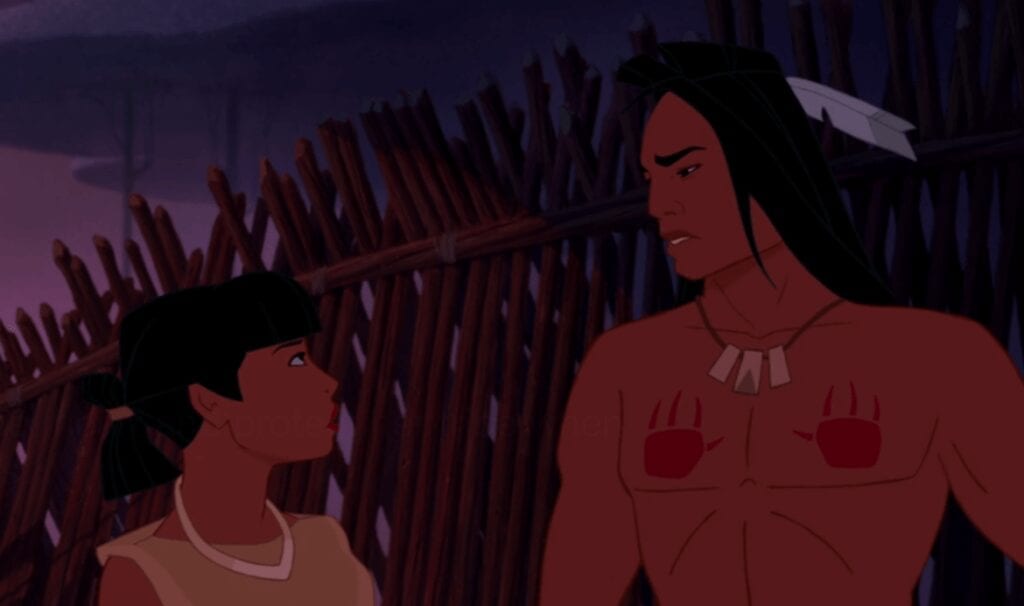
M: I get what you said about not being able to connect emotionally. That’s why Kokoum’s death doesn’t do anything for me. We know he’s a great warrior because they tell us, and that he’s serious. That’s it. We don’t know anything else so we can invest in the character. He’s always there and very stoic, so when he dies, it’s a tragedy, but it’s not heartfelt. Also, I agree with the fact that Disney tried to make a neutral story about what can only be defined as an invasion. The English were the invaders and colonizers, destroying the tribe’s land in their quest for gold. Why are the Native Americans also portrayed as unreasonable? They have every reason to be wary and to defend their land and, when Thomas kills Kokoum, they have every right to attack. I don’t dislike Thomas, but the fact that he kills someone and doesn’t receive any kind of punishment is bad writing. It would have meant a lot to his character arc to take responsibility for his actions and become a “man.” I don’t think they should’ve killed him, but at least imprison him or something. That being said, Kocoum is also to blame. He saw Pocahontas kissing John, and his anger was what? A jealous rage? He wasn’t hurting her, so I find him trying to kill John completely exaggerated. It would have meant something if Kocoum and Pocahontas had some kind of rapport, but they never talk to each other in the entire film. We know he wants to marry her, but they never even have a small talk, so his pain or rage or whatever was utterly unjustified. As for a favorite character, I would say Grandmother Willow. She’s wise and funny, and exactly what a mentor should be.
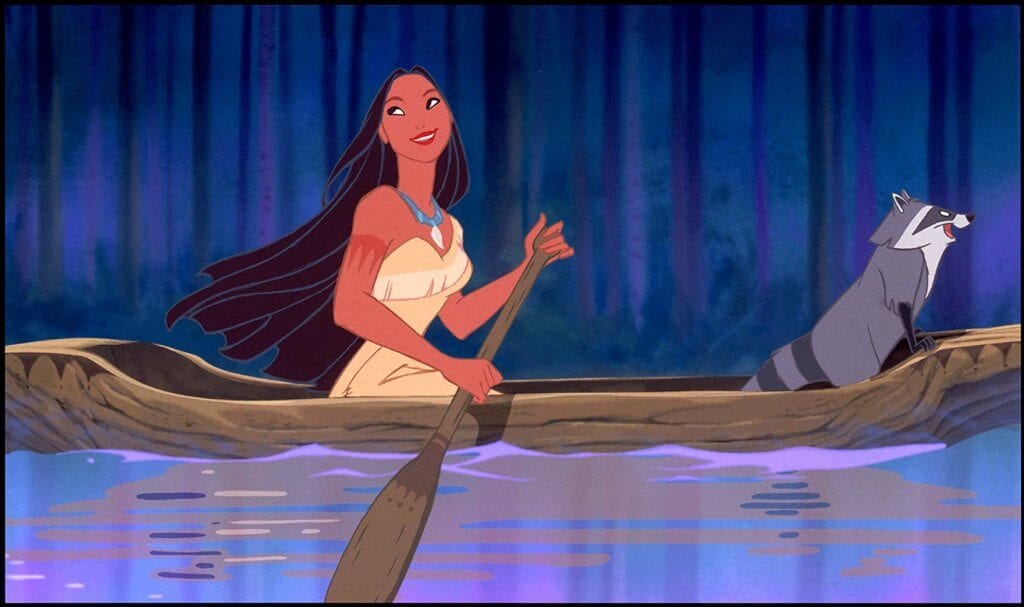
V: I totally agree about Kocoum’s death. When you contrast this to the end of characters like Mufasa and Bambi’s mother, it’s really pathetic. Pocahontas spends the whole film telling us how boring and serious Kocoum is (despite being very much so herself), and this is a huge part of the problem. Not only are we consistently hearing negative things about him, but we’re being told a lot and shown nothing. And then we’re expected to be devastated when he’s killed. As you mentioned, we only know he wants Pocahontas because her father tells her so. Does he even love her? We don’t know! It’s almost humorous how seriously the scene is played because it’s very difficult even to care. Being told who the characters are, as opposed to shown, is a huge problem throughout the movie. Pocahontas is a free spirit because Powhatan and Kekata say so. Kocoum is brave because they say so, and boring because Pocahontas thinks so. John and Pocahontas are in love because they repeatedly say so. It’s difficult to believe or invest in anything in this film because they keep stating it rather than demonstrating why it is so. I also agree with you about Thomas. What was the purpose, thematically and narratively, of having him commit this colossal mistake, if everybody just forgets about it? They try to punish John for it, but ultimately nothing becomes of it. While I question the validity of having the Native American princess literally talk to trees, I would have to admit Grandmother Willow is the most entertaining character. You got me there.

M: Let’s talk about one of the film’s strong assets: its music. The score, by Alan Menken, is unsurprisingly great and moves the movie along, helping lift the work when the story falters. The songs are also generally good, and it’s worth noting that this was the first film Menken worked with famed lyricist Stephen Schwartz. I like “Colors of the Wind” a lot, but my favorite is “Just Around the Riverbend.”
V: I agree, “Just Around the Riverbend” is a great “I want” song for our heroine, and one of her best moments in the film period. My favorite song in Pocahontas is, perhaps ironically, “If I Never Knew You.” This duet between Pocahontas and John Smith was deleted from the original theatrical cut and restored for the film’s 10th anniversary home video release. Even with it, the film is still subpar, but it does strengthen the main couples’ relationship a little, and it’s absolutely gorgeous. As an aside, Judy Kuhn, Pocahontas’ singing performer, is incredible. I think that “Mine, Mine, Mine” and “Savages” can be a little silly lyrically, but all of the music sounds great.
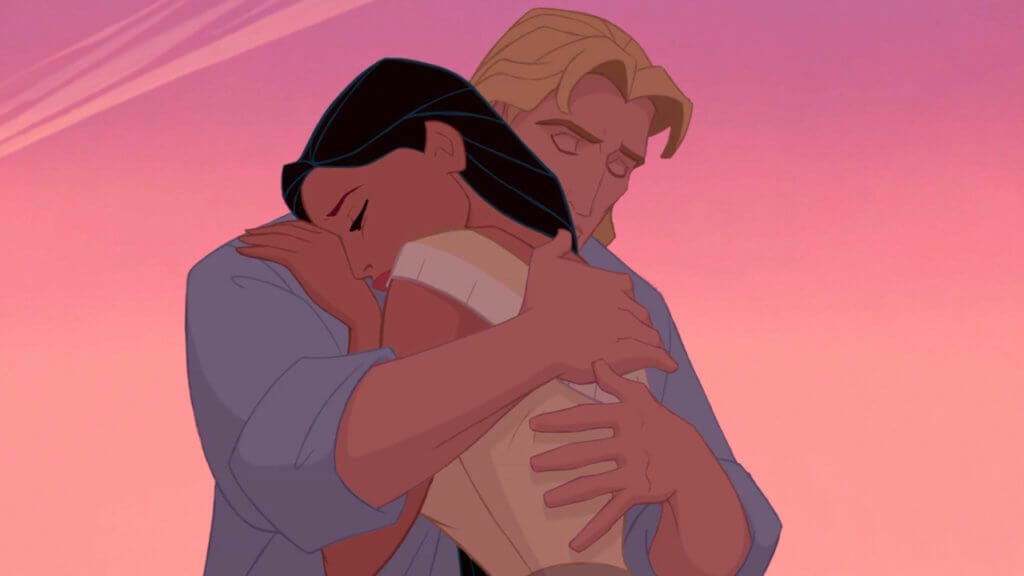
M: Totally agree with your “If I Never Knew You” assessment. The song is excellent, and it helps us invest a little bit more in John and Pocahontas’ relationship. Beauty and the Beast’s “Human Again” is an amusing yet unnecessary song, and The Lion King’s “Morning Report” is plain bad. However, this one feels essential to the plot, and its exclusion is just surprising and disappointing. And to make matters worse, while the 10th anniversary DVD offered the extended cut, the Blu-ray only has the theatrical cut. I think this was a stupid decision, but I’m not surprised coming from Disney’s home media division, which is a complete mess. I also agree that both of Ratcliffe’s songs are catchy, but a little silly, and I think that’s because he is a silly villain. Schwartz would make a much better song for Disney’s next villain, Frollo. Speaking of which, I’m surprised how Ratcliffe and Frollo are alike in terms of prejudice and racism. Frollo is a much more compelling character, whereas Ratcliffe just feels one-note and cartoony.
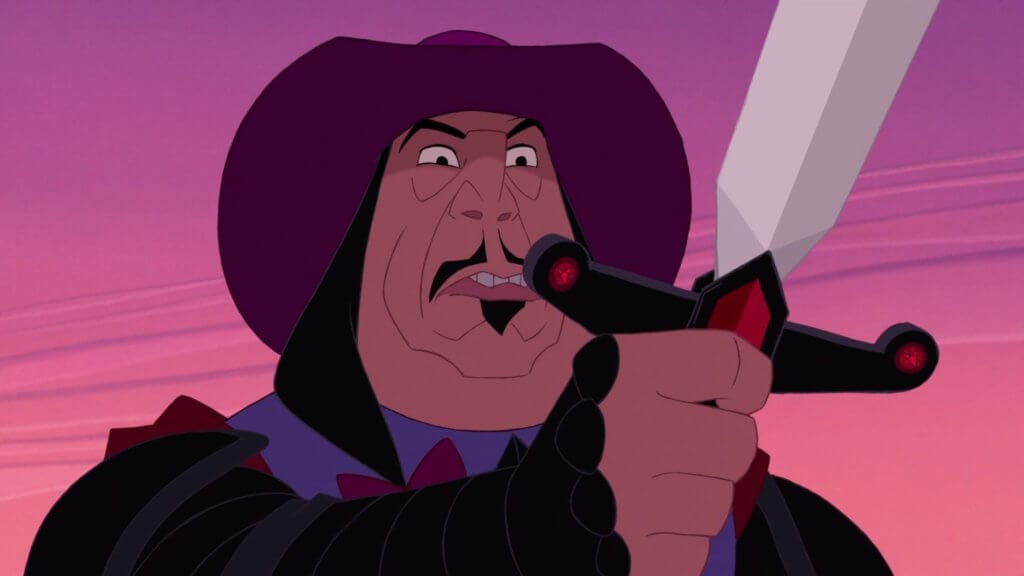
V: I agree entirely about Ratcliffe, and that Frollo has similar character traits and is executed so much better. “Savages” is a perfect example of how Pocahontas over-simplifies its characters and themes. As we already discussed, it makes it seem like the Natives held equal guilt to the English in the situation. It also has lines like “they’re not like you and me, which means they must be evil,” which is just so blunt it’s hilarious. Pocahontas seeks to tackle themes of racism and colonialism but fails miserably because of its insistence on remaining a family-friendly fairy tale.
M: I agree. I think they were afraid of making a darker film and they failed in trying to be completely neutral. The result is that the film just exists without making you feel any significant emotions. The next year they would do it much better (although they still could’ve done it even better; we’ll discuss it in that review). I believe that most of the blame lies with Katzenberg and his micromanagement. Both Eric Golberg and Mike Gabriel are excellent animators, and I think that if they had more liberty, it would’ve benefited the film. The “If I Never Knew You” exclusion is just one example of this.
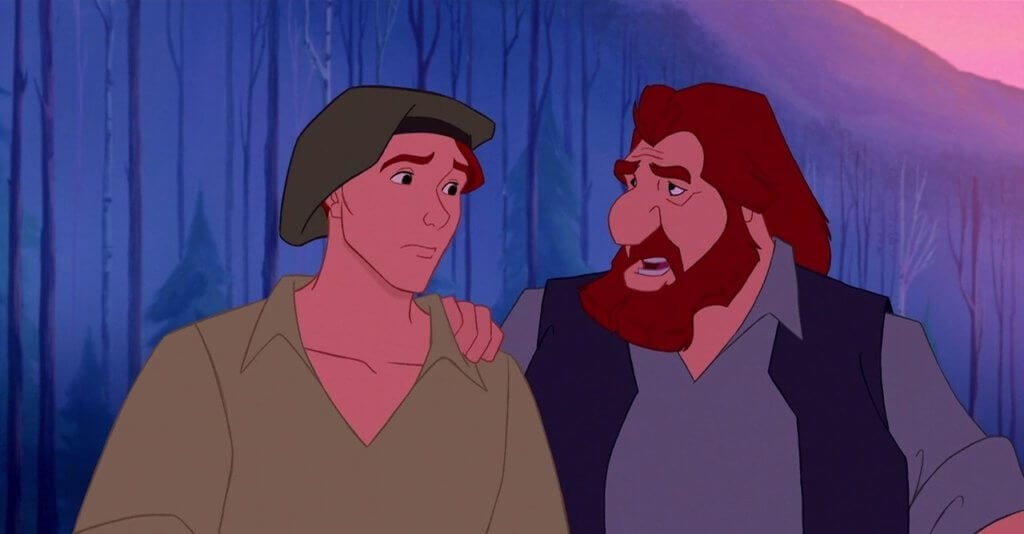
V: The Hunchback of Notre Dame is much better than Pocahontas in many ways, and I can’t wait to discuss it in detail. I tend to agree with you about Katzenberg. He was all about his Oscars and money and clearly had no idea what it would take to make this story work. After all, isn’t he the one who originally wanted to take “Part of Your World” out of The Little Mermaid? That’s a horrible idea!
M: That’s right. Everyone – Menken, Ashman, Clements, Musker, and Keane – had to fight to keep the song in the film. Can you imagine The Little Mermaid without it? I think that “If I Never Knew You” could’ve been a serious Oscar contender and may have even won over “Colors of the Wind.” Let’s talk about our favorite scenes. We talked a little bit about “Just Around the Riverbend,” but I also really like the beginning of the film. Not the “Virginia Company” scene, but right after that when we go and meet the Native Americans. I really like the score, the song “Steady as the Beating Drum,” and how they are presented. The animation is stunning. I also like the ending. For a film that played it safe for the most part, I like how Pocahontas chose to stay in her land rather than go with John. I love it when she sees the boat leaving and runs through the forest until they say goodbye through the leaves. Menken’s score is breathtaking, and the animation just sells the whole scene for me. What are some of your favorite scenes?
V: I agree with you about the final scene; it’s visually arresting, and the music is incredible in this sequence. I really wish the characters and their bond had been built up enough to earn this powerful ending. Most of my favorite scenes are the musical numbers because that’s when the characters and visuals really come alive. Ironically, “Mine, Mine, Mine” and “Savages,” in particular, are accompanied by some striking visuals; ditto “Colors of the Wind.”
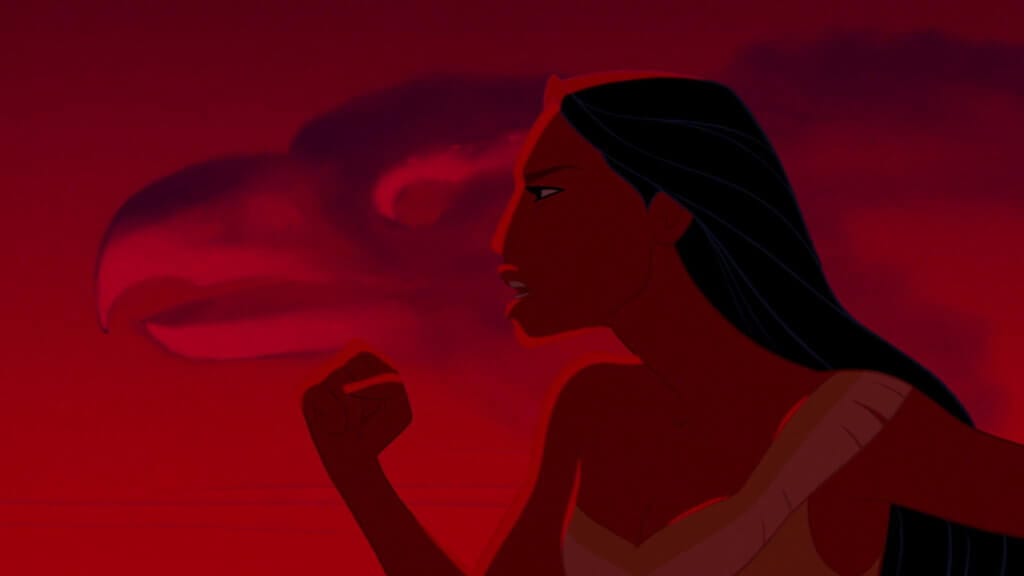
M: Indeed. For all the silliness in “Savages,” once it kicks in, you can’t help but feel excited about the conflict. I especially like the last part when Pocahontas runs to save John, and both sides are approaching each other. The vocal arrangements in that sequence are wonderful.
V: That moment is incredible. I get chills when Pocahontas sings, “How loud are the drums of war?” The visuals in Pocahontas are also very good for the most part. At times, I do think the film relies too much on naturalism, with lots of brown and green. But, as we’ve said, this surely isn’t the case during the songs.
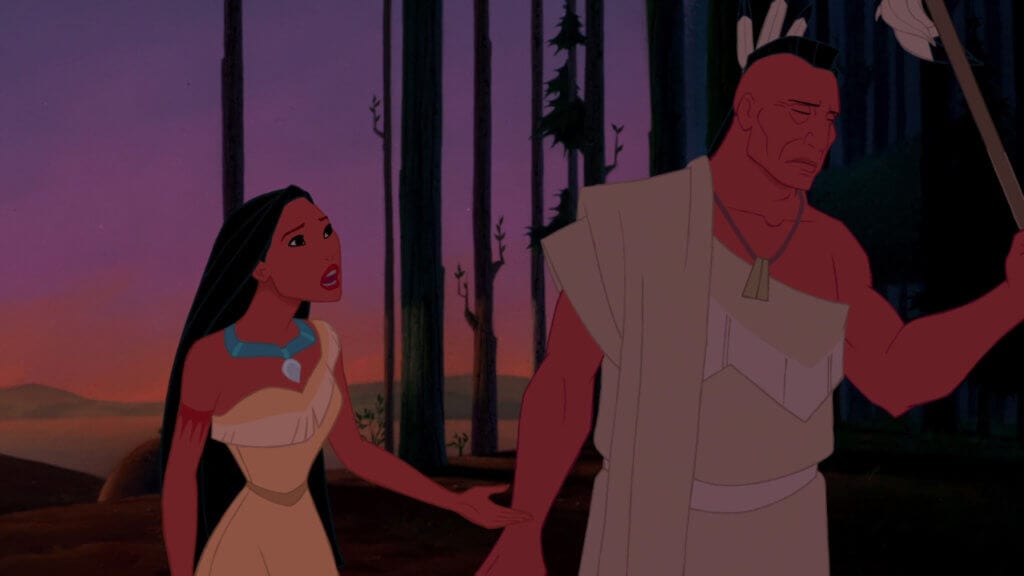
M: I like the visuals. I think they are different from what came before, and the landscapes are stunning. I agree that everything comes to life in the musical numbers. All in all, I think Pocahontas is an enjoyable, if middling, effort from the studio. It has great songs and score, nice animation, but the story and the characters need a serious rework. If handled better, it could’ve been spectacular, but it is what it is, and even despite that, it remains a very popular title within the canon.
V: Overall, I think Pocahontas is very average. It has an even spread of good and not-so-good aspects, and unfortunately, the characters and story fall into the latter category. Parts of the film are diverting, but I also find large chunks to drag by, and the movie’s under 90 minutes long.
M: What are your thoughts on Pocahontas? Let us know in the comments and don’t forget to come back for our review of The Hunchback of Notre Dame!
Pocahontas
Plot - 3
Acting - 6
Direction/Editing - 4
Music/Sound - 8
Animation - 9
6
Lacking
Pocahontas features beautiful animation and music, but it's lacking in character and story.



